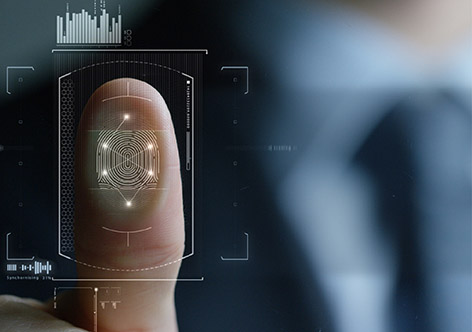Share:


Who needs plastic credit and ATM cards when you have your fingers, eyes and even voice to help you bank?
First, there was the plastic – credit cards that freed you from cash. Then, there were digital wallets and apps that helped you pay with your phone, with a tap of your fingers. Soon, you could be paying for a purchase or applying for a bank loan using your iris, withdrawing “digital coins” from an ATM onto a virtual wallet accessed through your thumbprint, and using voice recognition to conduct banking transactions with a chatbot anytime, anywhere on the planet.
All these financial transactions could well become commonplace in the coming years, thanks to cutting-edge technologies like biometric solutions, blockchain, and artificial intelligence (AI) that turn our bodies into a highly convenient and secure banking conduit.
Biometric banking transactions catch on
In China, hundreds of millions of shoppers are already scanning their fingerprint or taking a selfie to pay for their purchases. Take Alibaba’s annual Singles’ Day for instance. Over 60 per cent of customers for the world’s largest shopping event which hauled in over US$30 billion worth of transactions in one day on 11 November 2018, paid using biometric verification via their fingerprints or faces1.
Meanwhile, in Brazil, several banks have adopted fingerprint scanning for ATM use, bypassing ATM cards.
In the United States, Wells Fargo and other financial institutions use eye authentication through a software that works with a cellphone’s camera to map blood vessel patterns and other microfeatures.
Digital Currency
Biometric payments easily go hand in hand with a digital currency. More countries are moving towards becoming cashless societies, where people can make so-called “contactless” transactions that are safer and more convenient than handling physical cash.
Already, financial institutions and central banks in many countries including Singapore, Japan, the United States, and Europe are harnessing blockchain technology to launch digital coins.
In April 2019, the Monetary Authority of Singapore (MAS) and Central Bank of Canada successfully executed a transaction between two digital currencies, which some have touted as the world’s first. Singapore has been working on a token form of the Singapore currency as part of the government’s Project Ubin initiative to explore the use of blockchain, or distributed ledger technology, to conduct inter-bank transactions. This is part of the city state’s efforts to become a leading fintech hub.
Seamless, personalised banking
These innovations have a simple goal: make banking intimate. While it may still take years for biometric payments to become ubiquitous across the world, many financial and technology players already see it as a key enabler for bringing banking to the next level of sophistication and convenience.
For instance, robo-investing has taken off in a big way in recent years, helping people make decisions about investments and growing their money by removing emotions and banking on data. Just last year, UOB Asset Management launched UOBAM Invest robo-advisory service for corporates. It is the first in Singapore that harnesses the power of AI and human expertise to customise portfolios based on the needs of the corporate investor.
Way of the future
It may still take many years, a lot more innovation and coordination among banks worldwide for our bodies to become a mainstream banking channel enabled by digital currencies and technologies. But it is already clear that both financial institutions and customers are increasingly embracing a future where banking is getting more intimate.
Find out more about the United Global Innovation Fund, which invests in innovative companies across various industries.



